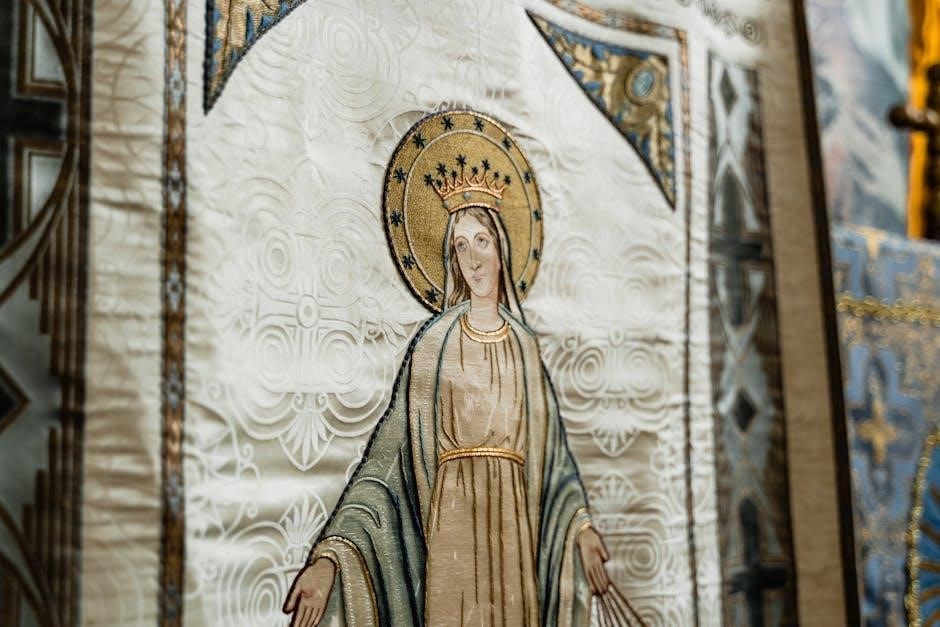bible study on deborah pdf
Deborah, a prophetess and judge, stands as a powerful example of faith and leadership in the Bible. Her story highlights God’s ability to use ordinary people for extraordinary purposes, inspiring believers to trust Him amidst challenges and embrace their calling with courage and wisdom.
1.1 Overview of Deborah
Deborah, a prophetess and judge of Israel, is one of the most influential women in the Bible. She lived during a time when Israel had no king, and God appointed her to lead His people. Known for her wisdom, courage, and unwavering trust in God, Deborah served as both a spiritual and military leader. Her role was unique, as she was one of the few women in the Old Testament to hold such authority. Deborah’s life exemplifies faith in action, as she relied on God’s guidance to deliver Israel from oppression. Her story is a powerful reminder of God’s ability to use anyone, regardless of gender or background, to accomplish His purposes. Deborah’s legacy continues to inspire believers today, offering lessons in leadership, obedience, and trust in God’s sovereignty.
1.2 Importance of Studying Deborah
Studying Deborah’s life offers valuable insights into faith, leadership, and trust in God. As a prophetess and judge, her story demonstrates how God equips ordinary people for extraordinary tasks. Deborah’s unwavering faith and courage in the face of adversity serve as a model for believers facing challenges today. Her leadership and obedience to God’s call highlight the importance of surrendering to His will. Additionally, Deborah’s role challenges traditional views on gender in ministry, showing that God can use anyone, regardless of background, to fulfill His purposes. Her life is a testament to the transformative power of faith and obedience, making her an essential figure for modern believers seeking inspiration and guidance. Deborah’s story remains a timeless example of God’s sovereignty and grace.

Background and Context
Deborah, a prophetess and judge, emerged during Israel’s turbulent period under the judges, providing leadership and guidance as a woman in a patriarchal society, inspiring faith.
2.1 Deborah as a Prophetess and Judge
Deborah, a prophetess and judge, served as a spiritual and civic leader in Israel, delivering God’s messages and resolving disputes under the “Palm of Deborah.” Her unique role as a woman in a patriarchal society underscored God’s ability to use anyone for His purposes. Deborah’s wisdom and faith were evident as she guided Israel during a time of chaos, demonstrating courageous leadership and unwavering trust in God. Her dual role highlights her significance in biblical history, showing how God equips individuals to lead and inspire others, regardless of gender or circumstances.
2.2 Historical Setting: Israel Under the Judges
The period of the Judges in Israel was marked by cycles of sin, oppression, and deliverance. Without a centralized monarchy, the nation relied on judges appointed by God to lead and rescue them from enemies. Deborah emerged during a time of chaos and spiritual decay, when Israel had turned away from God. The judges, often military leaders, were raised up by God to restore order and faith. Deborah’s role as a prophetess and judge underscored God’s presence and intervention in Israel’s history. Her leadership brought stability and spiritual renewal, demonstrating God’s ability to work through His people despite their rebelliousness and the challenging circumstances of the time.
Structural Elements of the PDF Guide
This guide is structured to enhance Bible study on Deborah, featuring a table of contents, instructions for use, and key sections on leadership, faith, and historical context.
3.1 Table of Contents
The PDF guide includes a detailed table of contents, organizing the study into chapters and sub-sections for easy navigation. Chapters cover Deborah’s introduction, her role as a prophetess and judge, historical context, leadership qualities, faith, the military campaign, the victory song, lessons from her life, modern applications, and additional resources. Each section is designed to deepen understanding and application of Deborah’s story. The table of contents ensures a logical flow, making it simple for readers to follow the study material systematically. This structure enhances the learning experience, providing clear access to key topics and theological insights.
3.2 How to Use This Study Guide
This study guide is designed to facilitate a deep and transformative exploration of Deborah’s life and legacy. Begin by setting personal study goals, such as understanding her leadership qualities or applying her faith principles. Read each section alongside the relevant Bible passages to enrich your understanding. Engage with reflection questions to connect Deborah’s story to your own life. Journaling your insights and prayers will help solidify lessons learned. Discuss key themes with a group to gain diverse perspectives. Finally, apply the practical lessons from Deborah’s life to your daily walk with God, embracing courage, faith, and obedience in every challenge.

Deborah’s Leadership
Deborah’s leadership exemplified wisdom, courage, and faith. As a prophetess and judge, she guided Israel with God’s direction, inspiring trust and unity during crisis and battle.
4.1 Deborah’s Role in a Time of Crisis
Deborah emerged as a pivotal leader during Israel’s turmoil under Canaanite oppression. With God’s guidance, she delivered prophetic messages and strategic plans, rallying her people against formidable foes. Her unwavering faith and courage inspired confidence, transforming fear into action and despair into hope. Deborah’s role was not just judicial but prophetic, bridging divine commands with practical actions. She exemplified trust in God’s promises, demonstrating how divine intervention could turn crisis into victory. Her leadership style, marked by obedience and wisdom, set a precedent for effective crisis management rooted in faith.
4.2 Leadership Qualities: Wisdom and Courage
Deborah’s leadership was distinguished by remarkable wisdom and courage. She exhibited wisdom through her ability to discern God’s will and communicate it clearly, guiding Israel with clarity and purpose. Her courage was evident in confronting challenges head-on, trusting God’s promises despite overwhelming odds. Deborah’s wisdom inspired trust, while her courage motivated others to act faithfully. These qualities empowered her to unite and lead Israel effectively, demonstrating that true leadership flows from a deep reliance on God. Her example challenges modern leaders to embrace wisdom and courage, trusting God’s sovereignty in all situations.
Faith and Trust in God
Deborah’s strong faith and trust in God were central to her leadership and decisions, enabling her to guide Israel with confidence and secure victories through divine intervention.
5.1 Deborah’s Dependence on God
Deborah’s reliance on God was evident in her role as a prophetess and judge. She consistently sought divine guidance, demonstrating a deep trust in His sovereignty. Her decisions were rooted in prayer and obedience to God’s will, reflecting her belief in His power and wisdom. Deborah’s dependence on God empowered her to lead Israel effectively, even in challenging times. Her actions showed that true leadership flows from a strong spiritual foundation, emphasizing the importance of surrendering to God’s plan. This dependence not only strengthened her resolve but also inspired others to trust in His faithfulness during crises. Her example remains a timeless lesson in faith-driven leadership.
5.2 The Power of Prayer and Worship
Prayer and worship were central to Deborah’s life and leadership. She actively engaged in communion with God, seeking His will and strength. Deborah’s song after the victory over Sisera exemplifies the power of worship, as she praised God for His deliverance. This act of worship not only celebrated the triumph but also reinforced Israel’s faith. Through prayer, Deborah connected with God’s heart, ensuring her actions aligned with His purposes. Her example teaches the transformative impact of prayer and worship in sustaining faith, gaining spiritual clarity, and glorifying God. These practices remain vital for believers today, fostering intimacy with God and empowering effective service.
The Military Campaign
Deborah led a decisive military campaign against Sisera, commander of Jabin’s army, with God’s assurance of victory. Her faith and obedience orchestrated a miraculous triumph.
6.1 The Battle Against Sisera
The battle against Sisera, commander of Jabin’s army, marked a pivotal moment in Israel’s history. Deborah, acting under God’s guidance, instructed Barak to assemble 10,000 men and confront Sisera. Despite his hesitation, Barak agreed to lead the army only if Deborah accompanied him. Deborah assured him of God’s victory but prophesied that the glory would go to a woman, not Barak. The battle unfolded miraculously, with God throwing Sisera’s forces into chaos. Sisera fled and sought refuge with Heber’s wife, Jael, who executed him by driving a tent peg through his temple. This victory showcased God’s power and Deborah’s unwavering faith, fulfilling her prophecy and securing Israel’s triumph.
6.2 Deborah’s Prophecy and Strategy
Deborah’s prophecy and strategic leadership were instrumental in the victory over Sisera. She received a direct command from God to instruct Barak to gather his forces and attack Sisera. Deborah’s prophecy reassured Barak of God’s presence and promised victory, stating, “I will deliver him into your hand.” Her strategy involved leveraging the terrain and timing, ensuring that Barak’s army would have the upper hand. Deborah’s leadership exemplified trust in God’s plan, demonstrating how divine guidance can lead to triumph even against overwhelming odds. Her role as both a prophet and a military strategist highlights her unique position and the effectiveness of her faith-driven approach.
Execution of the Battle Plan
Deborah led the execution of God’s battle plan with Barak, overcoming his reluctance. Jael’s bravery defeated Sisera, securing a miraculous victory for Israel, highlighting her faith and leadership.
7.1 Barak’s Reluctance and Deborah’s Assurance
Barak exhibited reluctance when tasked by Deborah to lead Israel against Sisera, requesting her presence for courage. Deborah agreed, assuring him of God’s victory but prophesied that the glory would go to a woman, fulfilling her words when Jael defeated Sisera. This moment showcased Deborah’s unwavering faith and Barak’s eventual obedience, emphasizing trust in divine plans over human strength.
7.2 The Victory and Jael’s Role
The victory over Sisera was marked by divine intervention and Jael’s bravery. As Sisera fled, Jael, a Kenite woman, offered him refuge, only to kill him with a tent peg, fulfilling Deborah’s prophecy. This act highlighted God’s use of unexpected individuals to achieve His purposes, showcasing faith and courage in action. The victory not only freed Israel from oppression but also demonstrated how ordinary people, guided by faith, can play pivotal roles in God’s plan, reinforcing the theme of trust and obedience in His providence. This event became a testament to God’s power and justice.

The Victory Song
Deborah’s victory song is a celebration of God’s deliverance, praising His power and faithfulness. It highlights the triumph over Sisera and Jael’s heroic role, reflecting deep theological themes of trust and divine sovereignty in Israel’s history.
8.1 Analysis of Deborah’s Song
Deborah’s song, recorded in Judges 5, is a triumphal hymn celebrating God’s victory over Sisera. It begins with a call to praise and recounts Israel’s deliverance, emphasizing God’s power and sovereignty. The song highlights Jael’s bravery and the dramatic downfall of Sisera, serving as both a historical account and a theological reflection. Deborah’s lyrics express deep trust in God, portraying Him as a warrior who fights for His people. The song also reflects the community’s gratitude and recognition of divine intervention. Its poetic structure and themes of faith and deliverance make it a powerful expression of worship, inspiring believers to trust God in times of crisis.
8.2 Theological Themes in the Song
Deborah’s song is rich in theological themes, emphasizing God’s sovereignty, justice, and deliverance. It portrays Yahweh as a divine warrior who fights on behalf of Israel, ensuring victory over their enemies. The song underscores the importance of faith and obedience, as seen in Deborah and Jael’s actions. It also highlights the contrast between the chaos of rebellion and the order restored through God’s intervention. Additionally, the song celebrates the unity of Israel under God’s leadership and serves as a reminder of His faithfulness to His covenant people. These themes resonate with broader biblical concepts, reinforcing trust in God’s providence and power.
Lessons from Deborah’s Life
Deborah’s life teaches courage, obedience, and trust in God. Her leadership shows how faith can empower individuals to overcome challenges and inspire others to follow God’s will faithfully.
9.1 Courage in the Face of Adversity
Deborah exemplified remarkable courage during Israel’s oppression by Jabin and Sisera. Despite the daunting threat of Sisera’s iron chariots, she fearlessly obeyed God’s command to rally Barak for battle. Her unwavering trust in God’s promise of victory demonstrated how faith can overcome fear. Deborah’s courage not only inspired Barak to act but also ignited the hearts of her people to rise against their oppressors. Her story reminds us that true courage is not the absence of fear but the willingness to trust God and act faithfully in the face of adversity, leading to triumph and glorifying Him;
9.2 Obedience to God’s Call
Deborah’s obedience to God’s call is a cornerstone of her legacy. She humbly accepted her role as a prophetess and judge, trusting in His guidance despite the challenges. When God instructed her to summon Barak for battle, she obeyed without hesitation, demonstrating unwavering commitment to His will. Deborah’s obedience not only led to Israel’s victory but also set an example for others to follow. Her story teaches us that obedience to God’s call, even in difficult circumstances, is essential for fulfilling His purposes and experiencing His divine intervention in our lives, just as He did for Deborah.
9;3 Effective Leadership Principles
Deborah exemplifies effective leadership through her wisdom, courage, and reliance on God. She led Israel during a time of crisis, demonstrating how a leader should trust in divine guidance and inspire others to do the same. Deborah’s ability to unite the people and delegate responsibilities, as seen in her collaboration with Barak, highlights the importance of teamwork and shared vision. Her leadership style, marked by humility and faith, serves as a timeless model for leaders today, encouraging them to seek God’s will and lead with integrity, compassion, and strength, thereby fostering a culture of trust and collective purpose.
9.4 The Role of Women in Ministry
Deborah’s role as a prophetess and judge challenges traditional views of women’s ministry, showcasing their potential for leadership. Her effectiveness in guiding Israel demonstrates that God equips both men and women to serve in significant capacities. Deborah’s story emphasizes that ministry is not limited by gender but by obedience and faith. She, along with other biblical women like Miriam and Huldah, proves that women can hold influential spiritual roles. This encourages modern women to embrace their calling, confident that their contributions are vital in advancing God’s kingdom, highlighting the importance of equality and diversity in ministry roles today.
Application in Modern Context
Deborah’s faith and leadership inspire modern believers to trust God in challenging circumstances. Her story encourages women and men to embrace their calling, leading with courage and wisdom, and to impact their communities for Christ, demonstrating that God’s power transcends time and empowers ordinary people for extraordinary purposes.
10.1 Identifying with Deborah’s Faith
Deborah’s unwavering trust in God serves as a timeless model for modern believers. Her faith was rooted in obedience and courage, even when faced with daunting challenges. Deborah’s reliance on God’s promises empowered her to lead Israel during a time of crisis, demonstrating how faith can transform ordinary individuals into extraordinary leaders. For today’s believers, identifying with Deborah’s faith means trusting God’s plan, even when circumstances seem insurmountable. Her story encourages us to step into our calling with confidence, knowing that God equips us for His purpose. By emulating Deborah’s faith, we can overcome fear, lead with wisdom, and glorify God in our lives and communities.
10.2 Applying Leadership Lessons Today
Deborah’s leadership offers timeless principles for modern application. Her ability to inspire and guide others, despite societal norms, highlights the importance of influence over authority. Today’s leaders can learn from her courage to stand firm in God’s plan and communicate vision clearly. Deborah’s reliance on prayer and divine strategy underscores the need for spiritual discernment in decision-making. By emulating her qualities—wisdom, compassion, and trust in God—contemporary leaders can foster unity and achieve impactful results. Deborah’s legacy reminds us that effective leadership is not about position but about faithfully stewarding the opportunities God provides, inspiring others to follow with confidence and purpose.
Deborah’s legacy is a testament to faith, courage, and God’s transformative power. Her story inspires trust in divine plans and embodies courageous leadership for modern believers.
11.1 Deborah’s Legacy
Deborah’s legacy is a profound testament to faith and leadership. As a prophetess and judge, she demonstrated unwavering trust in God, inspiring generations to embrace divine guidance. Her courage in rallying Israel against oppression and her wisdom in governance set a standard for godly leadership. Deborah’s story, particularly her victory song, highlights the power of faith and collaboration, showing how ordinary individuals can achieve extraordinary feats through obedience to God. Her life serves as a timeless example of how God equips and uses His people to bring deliverance and hope, leaving an indelible mark on biblical history and modern application.
11.2 Impact on Our Lives Today
Deborah’s life offers timeless lessons for modern believers, emphasizing courage, wisdom, and obedience to God. Her story inspires leaders to trust Him in challenging circumstances, demonstrating how faith can transform ordinary individuals into instruments of divine purpose; Deborah’s legacy challenges us to step out of our comfort zones and embrace God’s call, regardless of gender or societal expectations. Her example encourages believers to seek God’s guidance in decision-making and to trust in His power for victory. Deborah’s impact reminds us that our faith can leave a lasting legacy, influencing future generations to walk boldly in obedience to God’s will, just as she did.
Additional Resources
Explore recommended reading and further study materials, including Bible commentaries, theological essays, and reflection guides, to deepen your understanding of Deborah’s life and legacy.
12.1 Recommended Reading
For a deeper dive into Deborah’s story, explore resources like Bible Study Tools, Shepherd Press, and Christianity Today. These offer insightful commentaries, theological essays, and practical applications. The Standard Lesson Commentary provides structured analysis, while books on women in the Bible highlight Deborah’s unique role. Additionally, devotionals and study guides from Bible Reading Plan materials can enhance personal reflection. These resources are ideal for both individual and group studies, offering a comprehensive understanding of Deborah’s leadership, faith, and legacy, while connecting her story to modern-day applications of trust and obedience in God.
12.2 Further Study Materials
For deeper exploration, consider academic papers and scholarly articles, such as those from the Theological Faculty of the University of Zurich, which highlight Deborah’s theological significance. Multimedia resources like podcasts and video lectures offer dynamic insights into her leadership and faith. Additionally, books on Old Testament theology and commentaries by scholars like E. Chitando provide rich contextual analysis. Digital platforms such as Bible Gateway and Logos Bible Software offer downloadable resources, including sermons and study guides. These materials, along with journals from Christianity Today, enrich your understanding of Deborah’s role and legacy, offering a well-rounded approach to her story and its modern applications.

Bible Reading Plan
Daily reading schedule focuses on Judges 4-5, exploring Deborah’s story and song. Reflection and journaling encourage deeper insights into her faith, leadership, and trust in God’s plan.
13.1 Daily Reading Schedule
This 5-day reading plan guides you through Deborah’s story in Judges 4-5, focusing on her faith, leadership, and trust in God.
– Day 1: Judges 4:1-6: Introduce Deborah’s role as a prophetess and judge, exploring her call and message to Barak. Reflect on God’s unexpected leadership choices.
– Day 2: Judges 4:7-16: Study the battle plan and Barak’s reluctance. Ponder how faith and obedience intersect in challenging situations.
– Day 3: Judges 4:17-24: Examine the victory over Sisera and Jael’s role. Consider God’s use of unlikely heroes.
– Day 4: Judges 5:1-18: Analyze Deborah’s victory song, highlighting theological themes and praise. Reflect on the power of worship.
– Day 5: Judges 5:19-31: Conclude with the song’s conclusion and Israel’s response. Journal on personal lessons from Deborah’s life and leadership. This schedule encourages a deeper connection with Deborah’s story and its modern applications.
13.2 Reflection and Journaling
Reflecting on Deborah’s story encourages personal growth and spiritual insight. Journaling helps deepen understanding and application of her faith and leadership.
– Trust in God: Write about moments when, like Deborah, you trusted God despite challenges. How did He guide you?
– Courage in Action: Reflect on times you stepped out in courage. What fears did you overcome, and how did faith sustain you?
– Leadership Lessons: Consider Deborah’s wisdom and courage. How can you apply these qualities in your own life or ministry?
– Worship and Praise: Inspired by Deborah’s song, write a personal prayer or praise reflecting on God’s work in your life.
This practice fosters intimacy with God and aligns your heart with His purposes, just as Deborah’s story does.